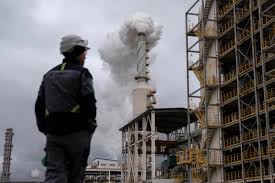A terrorist attack struck the Kropotkin oil pumping station in Russia’s Kavkazsky District earlier this week (February 17, 2025), an important facility within the Caspian Pipeline Consortium (CPC). The attack, carried out using seven drones loaded with explosives and shrapnel, targeted one of the largest oil pumping stations on Russian soil, causing extensive damage. While no casualties were reported among the station’s personnel, the economic and logistical impact of the strike has been significant.
The Kropotkin station plays a key role in the transportation of crude oil from Kazakhstan to global markets, as part of the 1,511-kilometer Tengiz-Novorossiysk pipeline. This pipeline is responsible for carrying a large percentage of Kazakhstan’s oil exports, making the facility crucial for both Kazakh and Russian energy exports.
Last year, the CPC transported over 63 million tonnes of oil along this route. However, the attack has already disrupted operations, with a 30 percent reduction in oil transportation expected in the coming months. CPC specialists believe that recovery of the station’s functionality will take one to two months.
The CPC’s official statement noted that the attack was not only aimed at crippling the facility but also at causing casualties among the personnel. “The terrorist strike was delivered using seven unmanned aerial vehicles loaded in addition to explosives with shrapnel. The attack was timed, aiming to not only disrupt the service of the facility, but also cause casualties among the station’s operations personnel,” said the report.
Although no fatalities occurred, the damage to the station was severe, with the roof destroyed, key electrical components damaged, and essential equipment such as transformers, gas turbines, and fire extinguishing systems heavily impacted. The station was promptly taken out of service, and oil transportation has been rerouted through an emergency system, resulting in a temporary decrease in pumping capacity.
Stakeholders and Their Interests
The Caspian Pipeline Consortium is a joint venture with several shareholders from both Russia and abroad. The consortium’s primary purpose is to facilitate the transportation of crude oil from Kazakhstan, as well as Russian fields, to the Black Sea. Key shareholders in the CPC include — Russian Federation: 24% of shares; JSC NC KazMunayGas (Kazakhstan): 19% of shares; Chevron Caspian Pipeline Consortium Company (USA): 15% of shares; LUKOIL International GmbH (Russia): 12.5% of shares; Mobil Caspian Pipeline Company (USA): 7.5% of shares; Rosneft-Shell Caspian Ventures Limited (Russia and Great Britain): 7.5% of shares; Eni International N.A. N.V. S.ar.l. (Italy): 2% of shares; BG Overseas Holdings Limited (Great Britain): 2% of shares; Oryx Caspian Pipeline LLC: 1.75% of shares; and Kazakhstan Pipeline Ventures LLC: 1.75% of shares.
While the Ministry of Energy in Kazakhstan confirmed that oil acceptance is continuing without restrictions, the temporary disruption at Kropotkin is expected to have a ripple effect. A reduction of up to 30 percent in oil pumping from Kazakhstan is forecasted, which could have significant consequences for global energy markets, particularly in terms of oil supply and pricing.

